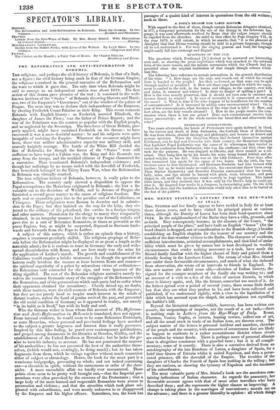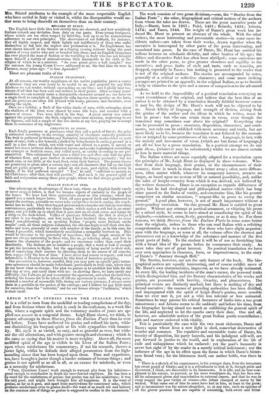MRS. BEERY' STISTED'S LETTERS FROM THE BYE-WAYS OF ITALY.
MRS. STISTED and her family appear to have resided in Italy for at least these dozen years, and to have visited its principal places at various times, although the Dutehy of Lucca has been their head-quarters since 1834. In the neighbourhood of the Baths they have a villa, grounds, and so forth. They consequently become, in the absence of the Court, "the principal people of the place," and have built an English " house" (for the word church is dropped, out of consideration to the Romish clergy,) besides establishing an English chaplain for the honour of our country and the benefit of the fine-weather visiters to the Baths. The character of residents, sufficient introductions, artistical accomplishments, and that kind of amia- bility which must be given by nature but is best developed in wealthy circumstances that render nothing necessary as a task, have made the Stisted family familiar with the higher classes of Italy and gained them a friendly footing in the Lucchese Court. The cream of what Mrs. Stisted saw under these favourable circumstances, and much of what she deduced from observation, she wrote off at intervals to friends in England. To this new matter she added some old,—sketches of Italian history, de- signed for the younger members of the family she was writing to ; and an account of a visit to a few of the cities of ancient Etruria, in which there is history again, and, like the former, somewhat too much of it. As the letters spread over a period of several years, there seems little doubt but that they are what they profess to be, and have been collected and published, if we understand rightly, with a view to the liquidation of a debt which has accrued upon the chapel, the subscriptions not equalling the builder's bill.
Beyond the historical matter,—which, however, has been written eon amore, the outpourings of impulse, not the result of a set task,—there is nothing stale in Letters from the Bye-Ways of Italy. Rome, Florence, Venice, Naples, et cretera, leaning towers, collect ons of art, and all the usual stock in trade of an Italian tour, are thrown over. The subject nutter of the letters is personal incident and anecdote, sketches of the people and the country, with accounts of occurrences that are likely to happen to residents in a rather mountainous district whose rivers are swollen by winter floods. There is perhaps more of personal allusion than is altogether consistent with a guarded taste ; but it is all compli- mentary, some of it courtly. There is also a narrative derived from an autobiography of the late Dutchess of Lucca, a daughter of Spain, for a brief time Queen of Etrmia whilst it suited Napoleon, and then a perse- cuted prisoner, tall the downfall of the Empire. The troubles of the daughter of Charles the Fourth of Spain lose nothing in the telling; but they are curious, as showing the tyranny of Napoleon and the insolence of his subordinates.
The most valuable parts of Mrs. Stisted's book are the anecdotes con- taining indications of Italian character. As regards the peasantry, her favourable account agrees with that of most other travellers who have described them; and she represents the higher classes as improving. A change is taking place in the marriages of convenience ; morals are on the advance ; and there is a greater liberality in opinion: all which things
Mrs. Stisted attributes to the example of the more respectable English who have settled in Italy or visited it, whilst the disreputables would ra- ther seem to bring discredit on themselves than on their country.
BNGLISH IN ITALY.
The English have little idea how strictly they are observed, and how sensitively Italians remark any deviation from duty on our parts. Even young foreigners, whose minds are too often warped by infidelity, look up to us for conscientious adherence to our own principles. The observance of our Sabbath, for instance, they all highly respect, anct think lightly and indifferently of those who suffer themselves to fall into the neglect and profanation of it. No Englishman has ever shown himself at the theatre on a Sunday evening without losing the good opinion of every native who saw or heard of him there; and no English clergyman has ever played the man of fashion or the worldling in Italy who has not brought upon himself a variety of animadversions little honourable to his cloth or the religion of which he is a minister. "So your priest gives a ball tonight!" was the sarcasm the young Count C--- addressed to us, the first time we were in Florence, many years ago: "is that Apostolic?"
These are pleasant traits of the
ITALIAN PEASANTRY.
At all seasons, our worthy neighbours of the native population prove a source of interest: they are ever ready to be useful to us, and grateful for any little kindness we can render, without encroaching on our time; and I gladly bear tes- timony of all that has been said and written in their praise. After so many years' residence, we can scarcely name a disreputable character around us; nor have we a single theft to complain of, though the villa has ten doors opening on the lawn, and the porticoes are often left littered with books pictures, and ffirnitnre, even
during the night. *
Once on a holiday, a flock of fine white ducks of ours, while swimming about the shallows of the river, were chased by some idle boys, and assailed with a shower of stones. Two were killed in the fray. A great outcry was raised against the perpetrators: the little culprits came next morning, requesting to see the Signora, and laid a couple of fine live ducks at my feet, praying me to accept them in assurance of my forgiveness.
CHESTNUTS AS FOOD.
Each family possesses or purchases what they call a patch of forest; the price is estimated according to the average quantity of chestnuts annually produced. The fruit is gathered in October and November, immediately smoke-dried on mats made of cane, with a fire beneath, (shelled by being beaten in sacks,) ground in a mill to a fine flour; which, wet with water and stirred to a paste, is spread on round hot stones between dried chestnut leaves; and a cake is produced resembling our crumpet or Scottish scone' and called necci, or netchy according to our pro- nunciation. This substantial food costs a third less and often only half the price of wheaten flour, and goes further in sustaining the hungry peasantry: but too much rain, or too little' or the least frost, ruins their harvest. The poorer classes are permitted to glean after a certain day; and all chestnuts that fall on the high road are public property. I once asked an old man, past eighty, with seven in family, if he had gathered enough? " Yes," he said, " sufficient to sustain us till Christmas: after that, God will provide." And such is the general spirit of faith and resignation among these poor people, whom we find always grateful and contented.
ITALIAN BYE-WAY INNS.
One advantage or disadvantage of these inns, where an English family rarely or never stopped before, is that we became objects of curiosity to the people of the house. We have had three generations about us this evening; which has spared you a much longer letter. First, all ages poured forth and volunteered to empty the carriage' a trouble we never take except they desire it, saying, the coach- house has no lock. They then begged permission to examine our various travelling conveniences, particularly my chaise longue, which makes a soft bed in an emer- gency, and yet folds up so small that it goes into an oil-cloth cover, and hangs by a strap on the dash-board. Vollies of questions followed: the first is always if my niece is my daughter, and how many I have besides? then, where we came from? complimenting us on speaking Italian " propria come Italiani, anche meglio"; and, all these subjects exhausted, the old ones begin to tell their own his- tones and woes, generally of some sick member of the family, as in this case, for whom I prescribe, which immediately establishes a sympathy between us. This would be tiresome to the generality of travellers; but the simple annals of the poor are always interesting to those who, like us, go loitering along, and love to observe the character of the people; and we encourage rather than repel their familiarity. The Italians are so sensitive a people, that a word or look is enough to put the intruders to flight; but the opportunity of being useful to their sick, and of comforting their sorrows by directing them to the source of all consola- tion, repays fully the loss of time. I have never had reason to repent; and local information is likewise to be obtained by this kind of harmless gossiping. One precaution is, however, needful, that you may part on equally good terms: your agreement should be made beforehand; particularly in little inns, where they do not know what to charge.. The plan we pursue is to establish fair bills for the first day or two and carry them with us: on showing these, we have rarely any difficulty : but two, go and reconnoitre the apartment, and select the beds first, ordering the horses not to be taken off till our agreement is made. Having accu- mulated a number of reasonable bills during our various journeys, I always carry them in a portfolio in the pocket of the carriage; and I believe we pay little more for ourselves than the " vetturini," and for our horses always " fordinario," which is their tariff.





























 Previous page
Previous page